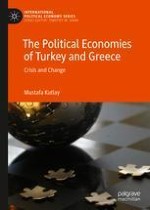2019 | OriginalPaper | Buchkapitel
4. Turkish Crisis and Aftermath (2001–2016)
verfasst von : Mustafa Kutlay
Erschienen in: The Political Economies of Turkey and Greece
Aktivieren Sie unsere intelligente Suche, um passende Fachinhalte oder Patente zu finden.
Wählen Sie Textabschnitte aus um mit Künstlicher Intelligenz passenden Patente zu finden. powered by
Markieren Sie Textabschnitte, um KI-gestützt weitere passende Inhalte zu finden. powered by
